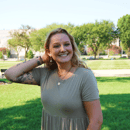I was absolutely terrified. I had never been to the gynecologist alone before, especially in a big city. Yes, I’m an adult, but you still want your mom to hold your hand through a few things, and this was definitely one of them.
I signed up online to the location closest to me and it was an super easy process. They even provided me with detailed instructions about how to get to the location on public transportation. I didn’t have to call or email any external platforms. With a few clicks, I had an appointment scheduled. A few days before my appointment, I was asked to register online to avoid filling out paperwork in the office. Sustainability – I liked it already.
I took the metro between classes into the city and walked a few blocks to get to the newly built sustainable-office-type building. I was half expecting a mob of protestors, but I was greeted with a locked door that required my ID and appointment time before I was allowed inside. Two really nice security guards greeted me and asked for my name and insurance information. My tensions eased as one of the men smiled and asked how my day was going. They pointed me to the front desk with a staff of nurses that needed to make a copy of my ID and insurance card. Then I sat down and waited for my name to be called.
It was time to start going for an annual check-up to make sure everything was working as it should. I sat down in one of the new chairs and looked around. The building was spotless and was beautifully decorated. Free condoms, coupons for birth control, and health pamphlets and information flyers were scattered on a few tables and bulletin boards. A reassuring gesture of help and resources made me feel even better. There were men and women that were called into the checkup rooms, which goes to show Planned Parenthood is a resource available for everyone.
The nurse called my name and led me into a typical doctor’s office. She took my vitals and asked a series of questions regarding my weight, height, previous medical history, sexual history, drug use, etc. She asked about my period and birth control use in a very normal matter, making me feel even more comfortable. She then asked a few questions about my safety and if I had ever felt unsafe in a sexual experience. After the series of questions, she took my blood and I peed in a cup, just as a routine STI/STD test. Then, the part I dreaded the most: the pap smear. The doctor came in and was one of the sweetest women ever. She told me everything she was going to do before she did it and walked me through the entire process. The constant reassurance and explanation of what she was doing comforted and calmed my nerves.
After the exams and results, the nurse and doctor gave me a few papers of everything that happened in the visit. She gave me extra resources and informational booklets in case I had any more questions. I gave my paperwork to the front desk and collected my receipt. With my university insurance, the appointment was free. Even without insurance, the appointment fee was $75. Compared to other doctor/gynecologist visits that can cost hundreds or even thousands of dollars, Planned Parenthood provides affordable options and professional healthcare expertise.
I was nervous going into the visit because of the inherent biases I didn’t know I had. I assumed that the office would be understaffed or not working efficiently because of the recent controversy regarding the continuation of its funding and purpose. This experience challenged my biases and really opened my eyes to public healthcare. Students all over the country should use these resources to their advantage and make sure they stay up to date on their healthcare.
Need to make an appointment? Click here!
Photos: 1


